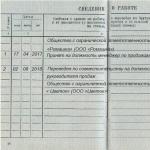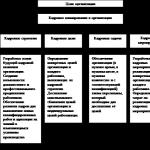Modal verb can Is one of the most common verbs in the English language. It is most often used when you need to express opportunity to perform some action, in other words, to say “I can do this”, “he can”, “you can” and so on. Verb could Is the past tense of the verb can, we will also look at it in this article.
Table: modal verb Can in affirmative, negative, interrogative forms
You can solve your problems later. - You can solve your problems later.
We can watch this movie next time. - We Can watch this movie next time.
Also, instead of the verb can, the phrase will be able to can be used to indicate the possibility in the future, read more about this below.
2. To make a request
Are used can and could in an interrogative form. Request with could sounds a little more polite, it is used in sentences addressed to another person (that is, not with the pronoun I).
Can I take your pen? - Can will i take your pen?
Can I suggest you another option? - Can do I suggest you another option?
Can you give me a hand? - Can't you can you help me (to give a hand - lit .: to give a hand, trans.: to help)
Could you tell me where the library is? - Can you tell me where is the library?
Could you do me a favor, please? - Couldn't will you do me a favor?
3. To express the prohibition
Verb can’t it is often used to express a prohibition, that is, to say not “you cannot”, but “you cannot”.
You can’t smoke here, there are kids playing. - Here it is forbidden smoking, children play here.
You can’t park here. It's a private territory. - To you it is forbidden to park here, this is a private area.
4. To express surprise, doubt, distrust
There are many nuances here, much depends on the context.
Doubt with a tinge of distrust is more often expressed in negative sentences with an indefinite verb:
He can’t swim across Lake Tahoe. - Yes can not he swim across Lake Tahoe (mistrust, doubt).
Surprise with a tinge of doubt, distrust is usually expressed in interrogative sentences with a verb in an indefinite form. In translation, the word “really” is often used to make the meaning clearer.
Can is this unicorn be real? - Really is this unicorn real?
If in the same question you use could the meaning will change slightly. You will end up with something like:
Could is this unicorn be real? - How could will this unicorn be real?
Often the same offers with can / could used ironically, sarcastically, for example:
Could you buy more milk? - And you even more milk could not buy?
Could you wake up any later? - And you even later could not wake up?
But in this case, intonation and context are of great importance. One of the heroes of the “Friends” series, Chandler, used such phrases from “Could it be” so often that he was even sometimes mimicked. Unfortunately, this feature of Chandler's speech was hardly reflected in the translation.
5. To express doubts about what happened
That is, I do not believe that something happened. Scheme: cannot + have + Past Participle (affirmative or interrogative form).
The phrase is usually translated using “cannot be,” or some other appropriate expression.
He is my best friend, he cannot have betrayed me... - He is my friend, it can't be that he betrayed me.
Billy doesn't have much money. He can’t have bought this car... “Billy doesn't have a lot of money. He couldn't this car buy.
Can she have forgotten to pick up the kids from house? - Really she could forget pick up the kids from home?
Turnover could have + Past Participle
Separately, we should consider the turnover could have + (past participle, third form of the verb). It can mean:
1. An action that someone could have done, but did not
She could have married him but she didn’t want to. - She could go out for him get married but didn't want to.
They could have bought a house here 20 years ago but chose not to. - They could buy here is a house 20 years ago, but decided not to.
There is often a tinge of reproach to this.
You could have helped me instead of just sitting there. - You could help me instead of sitting here.
I could have done more to help you. Sorry. - I AM could do more to help you. Sorry.
2. Assumption, guessing about something that happened in the past
In this case, with a slightly different meaning, can be used may have or might have, cm. " ".
Simon could have told her the truth. - Perhaps, Simon told her the truth.
They could have overheard what we said. - They could hear what we said.
In denial and question, you can use can have + Past Participle, then you get a turn like "Really ...?" or “It can't be ...”, discussed above (clause 5 “To express doubts about what happened”)
Can she have forgotten about our meeting? - How could she forget about our meeting?
He can’t have seen us. - Can not be so that he us saw.
3. Assumption of something that in reality did not happen
This case belongs to one of the types of conditional clauses, read more about them in.
I could have done well in my exam if I had worked harder. - I could do better on the exam if I prepared better.
Modal verb can and phrase to be able to
Verb can meaning “to be able to do something” can be replaced by a synonymous phrase to be able to+ verb (to be able to do something). But there is a difference between these two ways of expressing possibility.
Can / to be able to in the future tense
It is usually said that the turnover to be able to it is convenient to use when you need to say about the possibility of doing something in the future, because the verb can there is no future tense form (you cannot say will can).
But here it is important to remember this nuance.
The verb can itself can refer to the future. For example:
You can rest later. Now we have to work. - You can you(you can) rest later. We must work now.
We can read this book tomorrow, let’s play videogames. - We we can(we can) read this book tomorrow, let's play video games.
Future tense turnover to be able to is used when we talk about an opportunity, ability, skill that does not exist now, but it will appear in the future. Verb can CANNOT be used to express an opportunity, an ability that will appear only in the future.
Right: I will be able to walk properly after the surgery. - I AM I can walk normally after surgery.
Not right: I can walk properly after the surgery.
Another example:
Right: will be able to work as a sailor. - When I finish these courses, I I can work as a sailor.
Not right: When I complete this training course, I can work as a sailor.
Both variants, can or to be able to, can be used to refer to decisions or agreements related to the future:
The doctor can / will be able to see you later today. - Doctor will be able receive you later today.
I can / will be able to help you with your homework later. - I AM I can help you with your homework later.
I can / will be able to give you a lift home tonight. - I AM I can give you a ride home tonight.
Can / to be able to in the present tense
In present time to be able to sounds more formal, even weird. It doesn't matter if you say in Russian not “I can play the guitar”, but “I can play the guitar”.
I can play a guitar. - I AM can to play guitar.
I am able to play a guitar. - I AM capable of to play guitar.
Michelle can knows how bake delicious pies.
Michelle is able to bake delicious cakes. - Michelle capable of bake delicious pies.
Variants with can are used much more often.
Can / to be able to in the past tense
When it comes to an ability or opportunity that existed in the past, you can use both options:
When I was younger, I could could remember everything better.
When I was younger, I was able to remember everything so well. - When I was younger, I could remember everything better.
Note that in the past tense could usually means (in affirmative sentences) the ability to do something at all and is not used when talking about a one-time action at a certain moment. Here the meaning is more suitable to be able to.
Right: We were able to visit Mary on Monday, because she wasn’t busy. - We were able to visit Mary on Monday because she was not busy.
Not right: We could visit Mary Monday, because she wasn’t busy.
V negative sentences how couldn’t and wasn’t / weren’t able to can be used both for long-term actions and for one-off.
I couldn’t / wasn’t able to finish all my homework yesterday. - I could not to finish homework yesterday.
I couldn’t / wasn’t able to see the band at all from where I was standing. - I absolutely not seen(could not see) the musicians from where I stood.
I couldn’t / wasn’t able to drive when I was younger. - I AM did not know how drive when I was younger.

Friends! I am not currently a tutor, but if you need a teacher, I recommend this wonderful site- there are native (and non-native) language teachers for all occasions and for any pocket 🙂 I myself went through more than 80 lessons with the teachers I found there! I advise you to try it too!
- ‘Couldn’t of got it without you, Pops,’ Parker said ... (New Yorker). As a shortened form of couldn’t have, couldn’t of does unquestionably avoid the clumsy double contraction couldn’t’ve, a form not often seen in print since J. D. Salinger ... ... Bryson's dictionary for writers and editors
couldn "t of- Couldn t of got it without you, Pops / Parker said (New Yorker). As a shortened form of couldn t have, couldrit of does unquestionably avoid the clumsy double contraction couldntve, a form not often seen in print since J. D. Salinger stopped ... ... Dictionary of troublesome word
couldn "t- by 1670s, contraction of COULD (Cf. could) + NOT (Cf. not) ... Etymology dictionary
couldn "t- (could not) v. used to express the fact that one is unable or unwilling to do something; used to express the impossibility of an occurrence ... English contemporary dictionary
couldn "t- CONTRACTION ▪ could not… English terms dictionary
couldn "t- contraction could not… English World dictionary
COULDN "T- contr. could not. * * * / ˈKʊdn̩t / used as a contraction of could not I tried but I couldn t do it. couldn t care less see care, 2 ... Useful english dictionary
couldn "t- [[t] k ʊd (ə) nt] Couldn t is the usual spoken form of could not… English dictionary
couldn "t- [ˈkʊd (ə) nt] short form the usual way of saying or writing 'could not. This is not often used in formal writing I couldn t go to her party. ... Dictionary for writing and speaking English
couldn "t- Date: 1646 could not… New Collegiate Dictionary
couldn "t- / kood nt / contraction of could not. Usage. See care, contraction. * * *… Universalium
Books
- Mr. Waddington Of Wyck, May Sinclair. But the more he thought about it the less he liked the idea of consulting anybody. He was desperately afraid that, if he once began letting people into it, his scheme, his League, would be ...
More meanings of this word and English-Russian, Russian-English translations for the word "COULDN" T "in dictionaries.
- COULDN "T - Date: 1646 could not
Explanatory Dictionary of English - Merriam Webster - COULDN "T -: could not
- COULDN "T - / kood" nt / contraction of could not. Usage. See care, contraction.
Random House Webster "s Unabridged English Dictionary - COULDN "T - v. Used to express the fact that one is unable or unwilling to do something; used to express the impossibility ...
Explanatory Dictionary of the English Language - Edited by bed - COULDN "T - ˈku̇-t ə n (t) or ˈku̇nt Date: 1646: could not
Merriam-Webster "s Collegiate English vocabulary - COULDN "T - v. Pronunciation:" ku ̇ -d ə nt, -d ə n, dial also "ku ̇ -t ə n (t) or ...
Merriam Webster Collegiate English Dictionary - COULDN "T - ■ contraction could not.
Concise Oxford English vocab - COULDN "T - (1646): could not
Merriam-Webster English vocab - COULDN "T - couldn" t BrE AmE ˈkʊd ə nt —There is also a form ˈkʊd ə n, in standard speech used mainly…
Longman Pronunciation English Dictionary - COULDN "T - contr. Could not.
English basic colloquial vocabulary - COULDN "T - contr. Could not.
Concise Oxford English Dictionary - COULDN "T - contr. Could not.
Oxford English vocab - COULDN'T
Collins COBUILD Advanced Learner "s English Dictionary - COULDN'T - Couldn't is the usual spoken form of 'could not'.
Collins COBUILD - Explanatory Dictionary of English for Language Learners - COULDN "T - short form of could not - She couldn" t care less about me. Couldn "t you leave on Saturday instead?
Cambridge English vocab - COULDN "T
- COULDN "T - short for could not
- COULDN "T - colloquial; abbreviated from could not
Tiger English-Russian dictionary - COULDN "T - short for could not
- COULDN "T - short for could not
- COULDN "T - v. Could not, not possible
- COULDN "T - v. Could not, not possible
English-Russian-dictionary - Bed release - COULDN "T - colloquial; abbreviated from could not
- COULDN "T - could not, could not, could not
Computer English-Russian dictionary - COULDN "T - (colloquial) short for could not
- - COLLOCATIONS FROM OTHER ENTRIES can / can "t cope ▪ Older people can" t cope so well with the heat. don "t expect miracles ▪…
- - I. ˈtē noun (plural t "s or ts ˈtēz) Usage: often capitalized, often attributive 1. a.: The 20th letter ...
Webster "s New International English Dictionary - - (also t) / tiː; NAmE / noun [C, U] (pl. Ts, T "s, t" s ...
Oxford Advanced Learner "s English Dictionary - - T BrE AmE, t / tiː / (plural T’s, t’s) noun 1. the 20th ...
Longman Dictionary of Contemporary English -
Large English-Russian Dictionary -
Large English-Russian Dictionary - - n (pl Ts, t "s ti: z) 1. 20th letter of the English alphabet 2. 1> serial number 20 or 19 2>…
English-Russian-English Dictionary of General Vocabulary - Collection of the best dictionaries -
New Comprehensive English-Russian Dictionary - Apresyan, Mednikova - - n (pl Ts, t "s) 1. 20th letter of the English alphabet 2.1) serial number 20 or 19 2) ...
New Comprehensive English-Russian Dictionary - Apresyan, Mednikova - - n (pl Ts, t "s ti: z) 1. 20th letter of the English alphabet 2. 1> serial number 20 or 19 2>…
Large new English-Russian dictionary - - n (pl Ts, t "s ti: z) 1. 20th letter of the English alphabet 2. 1> serial number 20 or 19 2>…
Large new English-Russian dictionary - - I ti pl. - Ts, T "s tiz twentieth letter of the English alphabet; T - uppercase, t - lowercase - dot one" s ...
English-Russian Dictionary of General Vocabulary - - I ["Ђ] pl. - Ts, T "s [" ЂЄ] twentieth letter of the English alphabet; T - uppercase, t - lowercase - dot one "s i" s and cross ...
English-Russian Dictionary of General Vocabulary - - noun; pl. Ts, T "s twentieth letter of the English alphabet mark with a T source ≈ to burn a thief with a stamp in the form of a letter ...
New Comprehensive English-Russian Dictionary - - I abbr. from temperature temperature II abbr. from tension tension; tension III abbr. from t - true true 20th letter ...
New Comprehensive English-Russian Dictionary - YOUR
Longman DOCE5 Extras English vocabulary - YOU
Longman DOCE5 Extras English vocabulary - WELL - I. adverb COLLOCATIONS FROM OTHER ENTRIES a better / greater / deeper understanding ▪ All of this will lead to a better understanding of…
Longman DOCE5 Extras English vocabulary - OUT
Longman DOCE5 Extras English vocabulary -
Longman DOCE5 Extras English vocabulary - OFF
Longman DOCE5 Extras English vocabulary -
Longman DOCE5 Extras English vocabulary -
Longman DOCE5 Extras English vocabulary
More meanings of this word and English-Russian, Russian-English translations for the word "COULDN" T "in dictionaries.
- COULDN "T- Date: 1646 could not
Explanatory Dictionary of English - Merriam Webster - COULDN "T-: could not
- COULDN "T- / kood "nt / contraction of could not. Usage. See care, contraction.
Random House Webster "s Unabridged English Dictionary - COULDN "T- v. used to express the fact that one is unable or unwilling to do something; used to express the impossibility ...
Explanatory Dictionary of the English Language - Edited by bed - COULDN "T- ˈku̇-t ə n (t) or ˈku̇nt Date: 1646: could not
Merriam-Webster "s Collegiate English vocabulary - COULDN "T- v. Pronunciation: "ku ̇ -d ə nt, -d ə n, dial also" ku ̇ -t ə n (t) or ...
Merriam Webster Collegiate English Dictionary - COULDN "T- ■ contraction could not.
Concise Oxford English vocab - COULDN "T- (1646): could not
Merriam-Webster English vocab - COULDN "T- couldn "t BrE AmE ˈkʊd ə nt —There is also a form ˈkʊd ə n, in standard speech used mainly…
Longman Pronunciation English Dictionary - COULDN "T- contr. could not.
English basic colloquial vocabulary - COULDN "T- contr. could not.
Concise Oxford English Dictionary - COULDN "T- contr. could not.
Oxford English vocab - COULDN'T
Collins COBUILD Advanced Learner "s English Dictionary - COULDN'T- Couldn’t is the usual spoken form of ‘could not’.
Collins COBUILD - Explanatory Dictionary of English for Language Learners - COULDN "T- short form of could not - She couldn "t care less about me. Couldn" t you leave on Saturday instead?
Cambridge English vocab - COULDN "T
- COULDN "T- decomp. abbr. from could not
- COULDN "T- colloquial; abbr. from could not
Tiger English-Russian dictionary - COULDN "T- decomp. abbr. from could not
- COULDN "T- decomp. abbr. from could not
- COULDN "T- v. could not, not possible
- COULDN "T- v. could not, not possible
English-Russian-dictionary - Bed release - COULDN "T- decomp. ; abbr. from could not
- COULDN "T- colloquial; abbr. from could not
- COULDN "T- (spoken) abbr. from could not
- - COLLOCATIONS FROM OTHER ENTRIES can / can "t cope ▪ Older people can" t cope so well with the heat. don "t expect miracles ▪…
- - I. ˈtē noun (plural t "s or ts ˈtēz) Usage: often capitalized, often attributive 1. a.: The 20th letter ...
Webster "s New International English Dictionary - - (also t) / tiː; NAmE / noun [C, U] (pl. Ts, T "s, t" s ...
Oxford Advanced Learner "s English Dictionary - - T BrE AmE, t / tiː / (plural T’s, t’s) noun 1. the 20th ...
Longman Dictionary of Contemporary English -
Large English-Russian Dictionary -
Large English-Russian Dictionary - - n (pl Ts, t "s ti: z) 1. 20th letter of the English alphabet 2. 1> serial number 20 or 19 2>…
English-Russian-English Dictionary of General Vocabulary - Collection of the best dictionaries -
New Comprehensive English-Russian Dictionary - Apresyan, Mednikova - - n (pl Ts, t "s) 1. 20th letter of the English alphabet 2.1) serial number 20 or 19 2) ...
New Comprehensive English-Russian Dictionary - Apresyan, Mednikova - - n (pl Ts, t "s ti: z) 1. 20th letter of the English alphabet 2. 1> serial number 20 or 19 2>…
Large new English-Russian dictionary - - n (pl Ts, t "s ti: z) 1. 20th letter of the English alphabet 2. 1> serial number 20 or 19 2>…
Large new English-Russian dictionary - - I ti pl. - Ts, T "s tiz twentieth letter of the English alphabet; T - uppercase, t - lowercase - dot one" s ...
English-Russian Dictionary of General Vocabulary - - I ["Ђ] pl. - Ts, T "s [" ЂЄ] twentieth letter of the English alphabet; T - uppercase, t - lowercase - dot one "s i" s and cross ...
English-Russian Dictionary of General Vocabulary - - noun; pl. Ts, T "s twentieth letter of the English alphabet mark with a T source ≈ to burn a thief with a stamp in the form of a letter ...
New Comprehensive English-Russian Dictionary - - I abbr. from temperature temperature II abbr. from tension tension; tension III abbr. from t - true true 20th letter ...
New Comprehensive English-Russian Dictionary - YOUR
Longman DOCE5 Extras English vocabulary - YOU
Longman DOCE5 Extras English vocabulary - WELL- I. adverb COLLOCATIONS FROM OTHER ENTRIES a better / greater / deeper understanding ▪ All of this will lead to a better understanding of…
Longman DOCE5 Extras English vocabulary - OUT
Longman DOCE5 Extras English vocabulary -
Longman DOCE5 Extras English vocabulary - OFF
Longman DOCE5 Extras English vocabulary -
Longman DOCE5 Extras English vocabulary -
Longman DOCE5 Extras English vocabulary




